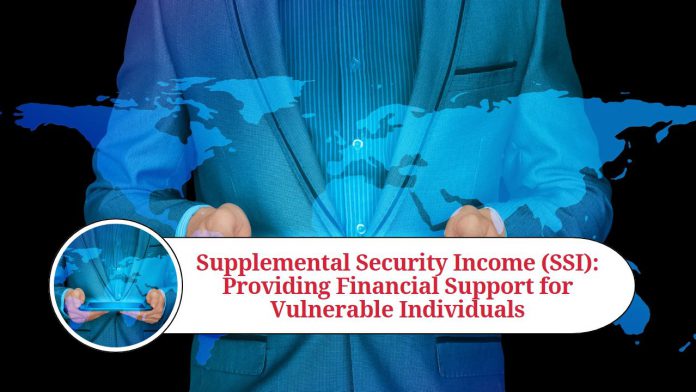Introduction
In an ideal society, every individual should have access to basic necessities and a decent standard of living. However, some members of our community face significant challenges due to various circumstances, such as disabilities, limited income, or old age. To ensure their well-being, the United States government established the Supplemental Security Income (SSI) program. In this blog post, we will delve into the details of SSI, its purpose, eligibility criteria, benefits, and the impact it has on the lives of those who rely on it.
Understanding Supplemental Security Income (SSI)
Supplemental Security Income, commonly referred to as SSI, is a federal assistance program administered by the Social Security Administration (SSA). Its primary objective is to provide financial support to disabled, blind, or elderly individuals with limited income and resources. The program aims to alleviate poverty and improve the quality of life for some of the most vulnerable members of our society.
Eligibility Criteria
To qualify for SSI, an individual must meet certain criteria, including:
- Age, disability, or blindness: Applicants must be at least 65 years old, blind, or disabled. The SSA has specific guidelines to determine disability and blindness, taking into account the severity and duration of the condition.
- Limited income: SSI is designed to assist individuals with limited financial resources. The program sets income limits, taking into consideration wages, pensions, Social Security benefits, and other sources of income.
- Limited resources: In addition to income, SSI also considers an individual’s available resources. This includes cash, bank accounts, investments, and property. However, some resources, such as a primary residence and a single vehicle, are exempt from consideration.
- Citizenship or legal residency: Applicants must be U.S. citizens or fall into certain eligible noncitizen categories.
Benefits and Coverage
Once approved, individuals who qualify for SSI receive a monthly cash benefit to help cover their basic living expenses. The benefit amount is determined based on the individual’s income and living arrangements. Additionally, SSI recipients may be eligible for Medicaid, which provides access to essential healthcare services, including doctor visits, medications, and hospital care.
Furthermore, some states offer supplemental benefits to SSI recipients, known as State Supplementary Payments (SSPs), to further enhance their financial support. These additional payments vary from state to state, depending on the cost of living and local regulations.
The Impact of SSI
The Supplemental Security Income program has a profound impact on the lives of those who depend on it. It serves as a crucial safety net, providing financial stability and essential support to individuals who may otherwise struggle to meet their basic needs.
- Alleviating poverty: SSI helps lift individuals out of poverty by providing a reliable income stream that allows them to afford housing, food, clothing, and other necessities.
- Access to healthcare: The Medicaid coverage that comes with SSI ensures that recipients have access to crucial healthcare services, promoting their overall well-being.
- Enhancing independence: SSI empowers individuals with disabilities to lead more independent lives by providing them with the means to support themselves financially and participate in society.
- Peace of mind for aging individuals: For older adults who may have limited retirement savings or face challenges due to declining health, SSI offers a lifeline to ensure a more secure and dignified existence.
Conclusion
Supplemental Security Income (SSI) plays a vital role in the United States’ social safety net, offering financial support and essential resources to disabled, blind, or elderly individuals with limited income and resources. By providing a lifeline to those in need, SSI helps alleviate poverty, ensures access to healthcare, and promotes independence. As a society, it is our responsibility to recognize and support the most vulnerable among us, and SSI represents a crucial step towards achieving that goal.
Read more useful content:
Frequently Asked Questions (FAQs)
What is Supplemental Security Income (SSI)?
SSI is a federal assistance program administered by the Social Security Administration (SSA) that provides financial support to disabled, blind, or elderly individuals with limited income and resources.
How is SSI different from Social Security Disability Insurance (SSDI)?
While both programs provide support to individuals with disabilities, SSI is based on financial need and is not dependent on prior work history or contributions, unlike SSDI.
How do I apply for SSI benefits?
To apply for SSI benefits, you can contact your local Social Security office or apply online through the SSA’s website. It is advisable to gather necessary documentation, such as proof of income, resources, and medical records, to support your application.
What are the income limits for SSI eligibility?
The income limits for SSI eligibility vary depending on factors such as marital status and living arrangements. Generally, the more income and resources you have, the lower your SSI benefit amount will be.
Are there any resources that are exempt from consideration when determining SSI eligibility?
Yes, certain resources are exempt from consideration, including a primary residence, one vehicle, household goods and personal effects, and funds set aside for burial expenses, among others.
Can I work and receive SSI benefits?
Yes, it is possible to work and receive SSI benefits. However, there are rules and limitations regarding income and employment, and your SSI benefit amount may be adjusted based on your earnings.
What medical conditions qualify for SSI disability benefits?
The SSA maintains a list of medical conditions that are considered disabling. However, even if your condition is not on the list, you may still be eligible if it prevents you from engaging in substantial gainful activity.
Can non-U.S. citizens receive SSI benefits?
Some non-U.S. citizens may be eligible for SSI benefits if they meet specific criteria, such as being a lawful permanent resident, refugee, or asylee. Eligible noncitizens must also meet other SSI requirements.
Is SSI available in all states?
Yes, SSI is available in all 50 states, the District of Columbia, and the Northern Mariana Islands. However, some states provide supplemental payments, known as State Supplementary Payments (SSPs), which can vary in amount.
Can SSI benefits be appealed if the application is denied?
Yes, if your SSI application is denied, you have the right to appeal the decision. The appeals process typically involves requesting a reconsideration, followed by a hearing before an administrative law judge if necessary.




















